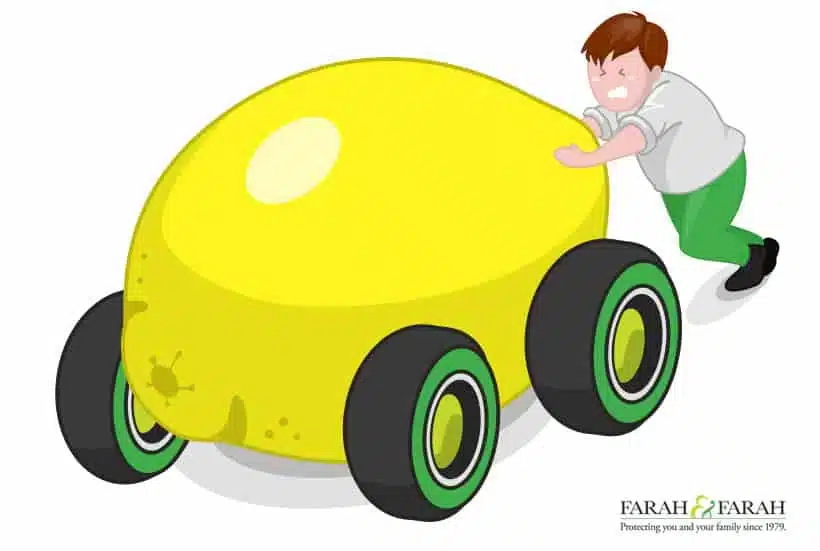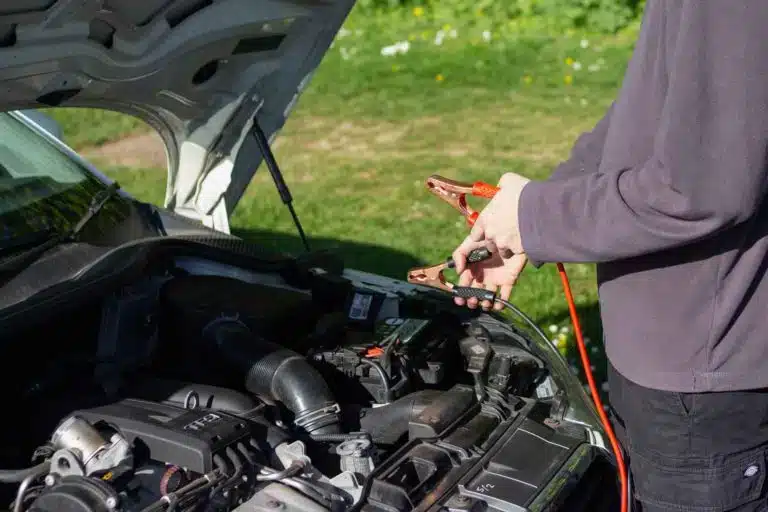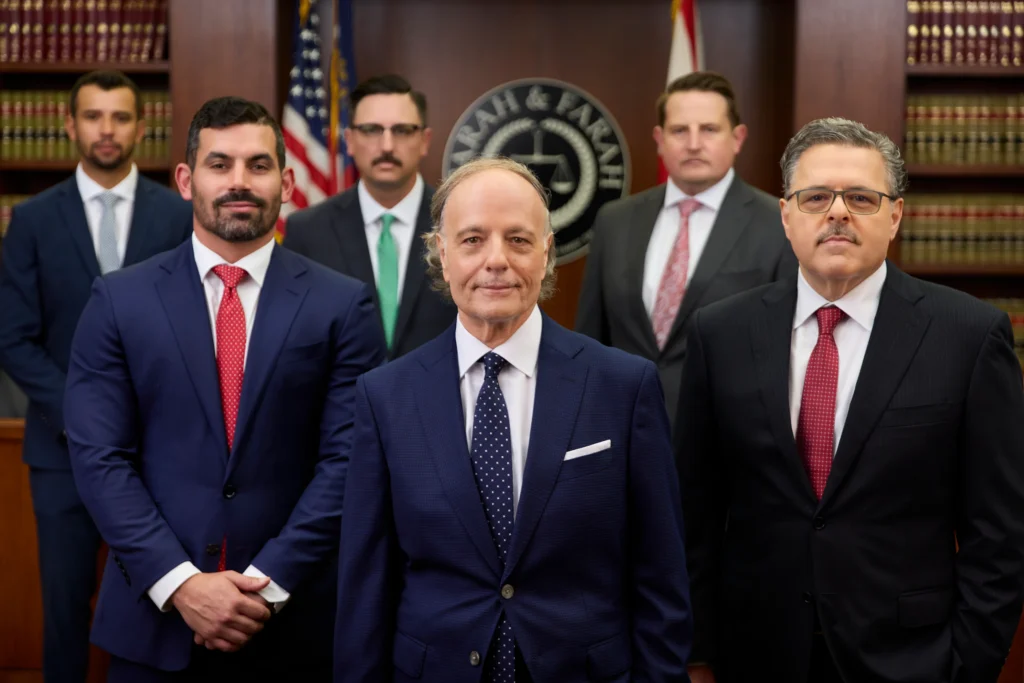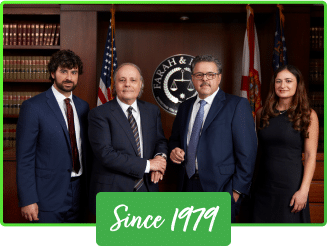Car Lemon Law Attorneys
Buying a new car is exciting, but also expensive. It’s not an everyday purchase. You rely on your car to take you where you need to go, whether that’s to work, to school, to visit friends and family, or on a road trip across the country. You need to be able to trust your car and feel safe driving it. You can’t do that when your car is constantly needing repairs because it’s turned out to be a lemon.

FREE CASE REVIEW
Home > Lemon Law Attorneys > Car Lemon Law Attorneys
Vehicle manufacturers are bound by their warranties to repair or, if that proves to be impossible, replace or refund your car. But what if the manufacturer insists that your car isn’t a lemon and refuses to honor the warranty? Fortunately, you have recourse in the law. Both federal and state laws require manufacturers to honor warranties and replace vehicles that are proven to be lemons.

What Cars Qualify Under the Law?
Any new car that has a defect that affects its daily use can qualify as a lemon. There are legal requirements for the number of repair attempts and a certain number of days out of service for repairs before the car is eligible for replacement or repurchase under the law, however. Plus, there are steps that the owner of the vehicle must take to meet the legal requirements, including properly notifying the manufacturer of the defect and allowing final repair attempts.
If you bought a car used, it’s possible that it may be covered under the law, but only if it has a warranty and is still within that warranty period.
Who Is Protected Under the Law?
You don’t have to be the legal owner of a vehicle to be able to take advantage of federal and state laws regarding lemons. However, if you are leasing the vehicle, you must be the one responsible for repairs and the upkeep of the vehicle. If you are a lessee and aren’t responsible for this, then the owner of the vehicle would need to be the one to pursue relief under the law.
European Sports Cars
If your car is a European car, especially a sports car, there may be a higher likelihood that it could turn out to be a lemon. European car manufacturers have been facing more warranty claims on average than car manufacturers from anywhere else in the world. European car manufacturers also spend more on repairs on average than other manufacturers.
If you own a European sports car and it’s experienced any problems, it’s a good idea to review the warranty and keep copies of all repair documentation.
What Laws Protect Me?
When it comes to cars that are proven to be lemons, there are two possible avenues of relief. The first is the Magnuson-Moss Warranty Act, which is a federal law requiring manufacturers to honor their warranties. The second is state lemon laws, which operate on the state level. The requirements for these state lemon laws may vary depending on your state.
Magnuson-Moss Warranty Act
The purpose of the Magnuson-Moss Warranty Act, which was passed in 1975, was to ensure that manufacturers didn’t have deceptive warranty practices. It covers all consumer products, not just vehicles, and requires manufacturers to produce products held to a certain standard. Express warranties must meet the requirements of the law to keep products up to a certain standard. There may also be an implied warranty, which is defined at the state level, which protects products even if the manufacturer doesn’t offer their own warranty.
The Magnuson-Moss Warranty Act also requires manufacturers to pay the legal costs of consumers in the event of a successful case.
WHEN IS IT A BREACH OF WARRANTY?
There are two types of warranty: express warranties and implied warranties. Express warranties are the written, official warranties that companies provide with their products. They’re the promises a company expressly makes about their products. Implied warranties, on the other hand, aren’t written or officially stated, but they are understood to hold products to a certain standard that is assumed by the circumstances of the sale. For example, a car should be expected to run safely and is assumed to do so when it’s purchased from the dealership.
A breach of warranty occurs when a product fails to meet the standards to which the warranty holds that product. The legal definition of an implied warranty may vary depending on the state, so it’s important to follow all repair requirements for your vehicle and consult with an attorney so you know you’re meeting the consumer responsibilities.
State Lemon Laws
At the state level, state lemon laws protect vehicles. They require that the vehicle undergo a certain number of repair attempts for the same issue or be out of service for repairs that aren’t part of normal maintenance for more than a certain number of days in order to qualify as a lemon.
In Florida, this is three repair attempts, not including the manufacturer’s final repair attempts, or thirty total days out of service for repairs.
$2+ BILLION IN RESULTS

How Does the State Lemon Law Work?
All fifty states have lemon laws. The requirements and relief available under those laws may vary depending on which state you live in, so it’s important to consult an expert if you are pursuing relief under state lemon laws.

Repair Attempts
The lemon law process starts after three repair attempts for the same issue or fifteen days of the vehicle being out of service for repair. It’s important that you maintain documentation of every repair attempt. The mechanic should provide you with documentation, but if they do not, make sure that you request it.
Lemon Law Rights Period
The Lemon Law Rights Period is, in Florida, 24 months from the date of purchase. The initial repairs to the vehicle must be completed in that time period and the manufacturer must be notified of the defect within sixty days of the end of the Lemon Law Rights Period.
Manufacturer Notification
After three attempts at repair have been made for the same issue, the consumer is required to allow the manufacturer a final repair attempt. The manufacturer must be notified by either certified or express mail. There’s an official Motor Vehicle Defect Notification Form that must be filled out and sent to the manufacturer. It’s available at the Florida Attorney General’s website.
It’s also recommended that you fill out three copies of the form. Keep one for your own records, but send the other two out. The first should go to the manufacturer that holds the warranty of your vehicle. The second should be sent to the Attorney General’s Office’s Lemon Law Research Unit.
Depending on your state, the notification letter may need to be sent to the manufacturer within the Lemon Law Rights Period. Some states may allow a window of time outside of that period in which to send the notification, so long as the repairs were made within the Lemon Law Rights Period.
Final Repair Attempt
The manufacturer has the right to make final repair attempts on the vehicle before repurchase or replacement is required. The final repair attempt does need to be done either at the manufacturer or at an authorized service agent of the manufacturer, which is typically the dealership. The manufacturer has the right to inspect and attempt to repair your vehicle themselves without having to trust a mechanic that is not affiliated with them in any way.
If at this point, the defect in your car isn’t or cannot be repaired or your vehicle has been out of service for thirty days or more for repair, the law sees your car as a lemon that the manufacturer is required to repurchase or replace. The law counts any work done as the final repair attempt, even if no parts were replaced. The law also requires the manufacturer to provide you with documentation so you know exactly what has been done.
Replacement or Repurchase
Once your car legally qualifies as a lemon, the manufacturer is required to either replace the vehicle or repurchase it at the price the consumer paid for it, taking into account the mileage and usage of the car before the nonconformities were discovered. If the manufacturer refuses to honor this requirement, that’s when you have legal recourse to pursue arbitration.
Filing a Claim
The manufacturer may have their own arbitration system for grievances. Your state’s lemon laws may require you to go through that arbitration first. However, if the manufacturer does not have its own procedure or if you aren’t satisfied with the results, you still have recourse. In Florida, you can file a claim with the Florida New Motor Vehicle Arbitration Board by filing a Request for Arbitration.
for the family of a motorcycle rider killed by a driver who ran a red light
for a passenger injured when a truck struck a motorcycle
in the wrongful death of a wife who died in a motorcycle collision with a dump truck
for a rider who suffered a severe leg injury when struck by a car
for a rider injured when a careless driver pulled out in front of the motorcycle
Consult with an Attorney
If your car is defective, the manufacturer has an obligation to repair it, and if that fails, replace or repurchase it. The law requires manufacturers to keep their products to a certain standard of quality, whether they have an express warranty or not. If you have gone through all of the required repair attempts and properly notified the manufacturer, you’re entitled to that replacement or repurchase. If the manufacturer refuses, you can pursue recourse, usually arbitration, under the law.
It’s important to consult with an attorney during this process so you can ensure that you’re following every step correctly. Whether you’re wanting relief under the Magnuson-Moss Warranty Act or under state lemon laws, an experienced attorney can help make sure you navigate every step of the way properly.
Lemon laws differ by state, so it’s important to make sure you’re following all of the requirements for your state. A lawyer can help ensure that you have and that your vehicle meets all of the legal requirements to be seen as a lemon. This includes the requisite number of repair attempts, proper notification, and time the vehicle spent out of service for repairs. An attorney can also help you navigate the arbitration process and represent your interests.

If your car is a lemon and the manufacturer has refused to replace or repurchase it as required by the warranty or by your state’s lemon laws, contact Farah & Farah. We can negotiate settlements and send demand letters for car owners in any state of the US, and for Florida residents, we can file a lawsuit if it becomes necessary. Our team of attorneys has experience getting clients the justice and compensation they deserve in lemon law cases. We charge you nothing unless your case is successful.














FREE CASE REVIEW
